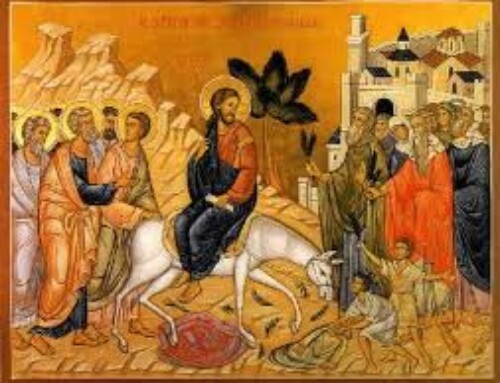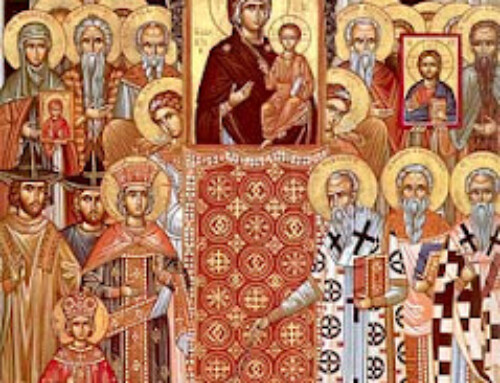From The Word Magazine, April 1986, Page 5
Making Good Use of Great Lent
by Father Peter G. Rizos
One of the first things we consider when planning a trip is where we are going — our destination. Great Lent is a very special trip. It is a holy pilgrimage which, if understood and planned properly, can lead us to the very mystery of God’s mighty act of sacrificial love and glory.
Great Lent takes us to Calvary where the Lord Jesus redeemed us from the bondage of sin, death, and Satan himself, by His saving Death upon the Cross. But our destination is the lord’s glorious Resurrection by which everlasting life in God’s Kingdom has been assured to those who in faith and love follow Him. The significance of this spiritual pilgrimage is that it affords us the opportunity to renew experientially both the death and the newness of life that the Lord’s saving act makes real for our lives in Baptism. People who take trips to distant places usually do so because they can afford it. The People of God who participate in Great Lent do so because they know that they cannot afford not to.
The Holy Fathers of the Church have determined that there are three indispensable means of participating in Great Lent. They are fasting, spiritual vigilance and prayer. These disciplines derive from God’s word and have through the centuries been the mainstay of Eastern Orthodox spirituality or life in Christ.
When Jesus had fasted forty days and forty nights in the wilderness in preparation for His saving ministry, we are told that the devil tempted Him to change stones into loaves of bread. The lord rebuked the tempter with the words, “It is written, ‘Man shall not live by bread alone, but by every word that proceeds from the mouth of God'”(Matthew 4:14; Deuteronomy 8:3). In this way Jesus succeeded where Adam had failed (Genesis 3:1-6). His answer to Satan is a trenchant affirmation that to live our lives as though God did not exist, that is, “by bread alone,” is to live according to a demonic lie.
The Lord’s words and steadfast self-denial alert us to the particular lifestyle He expects of His followers, expressed elsewhere: “Enter by the narrow gate; for the gate is wide and the way is easy, that leads to destruction, and those who enter by it are many. For the gate is narrow and the way is hard, that leads to life, and those who find it are few” (Matthew 7:13-14).
Genuine and informed fasting which subjects our flesh and its passions to the will of a humbled and contrite spirit is perhaps the most effective means to grow in God’s grace (see Romans 8:1-17). It opens our innermost self to the promptings of the Holy Spirit Who yearns to make our soul His temple. It is this possibility for growth in Christ-likeness through fasting that should fire our self-discipline according to the canons and rules of the Church. Adherence to dietary prescriptions alone easily deteriorates as a negative preception of Lent which does violence both to the intent and purpose of fasting. The point is to give up a measure of our dependence upon the material world in order to experience personally our hunger for God.
Spiritual vigilance is an attitude of alertness and eager expectation both for the coming of the Lord and the averting of worldly distractions which would divert our attention from Him. The Church as the Bride of Christ constantly strives to awaken Her members to the immanence of the Second Coming of Her Bridegroom, as well as the presentation of our soul before His judgment-seat upon our death. It is incredible how far our values have strayed from this very basic perspective of life according to the Orthodox Christian Faith!
Our life on earth becomes meaningful only to the degree that we appreciate it as a preparation for the life-to-come. Lent is the best time to acquire sobriety, to make provision for reflection on the meaning of our existence, to recognize and confess our sins. Seeking out periods of silence, constructive reading, and depth in our interpersonal relationships are all of the essence of a vigilant life. All these things the world in its vanity and hectic pace of daily living seeks to deny. Yet it is in the inner realm of the heart, the seat of all thoughts and desires, that the life-and-death struggle for the salvation of our soul must ultimately be waged. The counterpart of the pilgrimage to the Crucified and Risen Lord is the journey into our own inner depths where our soul meets and rejoices in her Bridegroom and Savior.
As physical training requires proper nourishment to keep up the vigor of the body, so too do spiritual exercises need prayer to maintain the harmony of the soul. Prayer is not just another activity in addition to fasting and vigilance, but rather the inner state which gives meaning and direction to all life in the spirit. One does not, properly speaking, “say” his/her prayers. One rather becomes a prayer by means of concentrated effort, regular practice and openness to the Holy Spirit.
Prayer is not merely an occasional call for divine intervention when human resources fail, nor the recourse of the weak in body and spirit. It is rather the actualization of personhood to its highest level at which the members of the Body of Christ become constantly renewed and empowered by the uncreated energies of the Holy Trinity. Prayer may be expressed as petition, intercession, thanksgiving and doxology. Whatever its form or its content, whether structured or spontaneous, prayer is the pulse-beat of life in Christ, without which the soul withers and dies.
We pray best when our stomach is light and our mind is attuned to things of the spirit. We fast best when we pray and guard jealously the purity of our inner sanctuary. We are vigilant best when our will is fortified with fasting and prayer, and with the Body and Blood of our Savior. “Taste and see that the Lord is good!” the Psalmist urges us strongly. There is no substitute for our personal experience of making good use of Great Lent. Light, peace, and joy are there for the asking.
Fr Peter G. Rizos, Ph.D., is the Pastor of Transfiguration of Our Savior Orthodox Church in Frank/in, New Hampshire.



